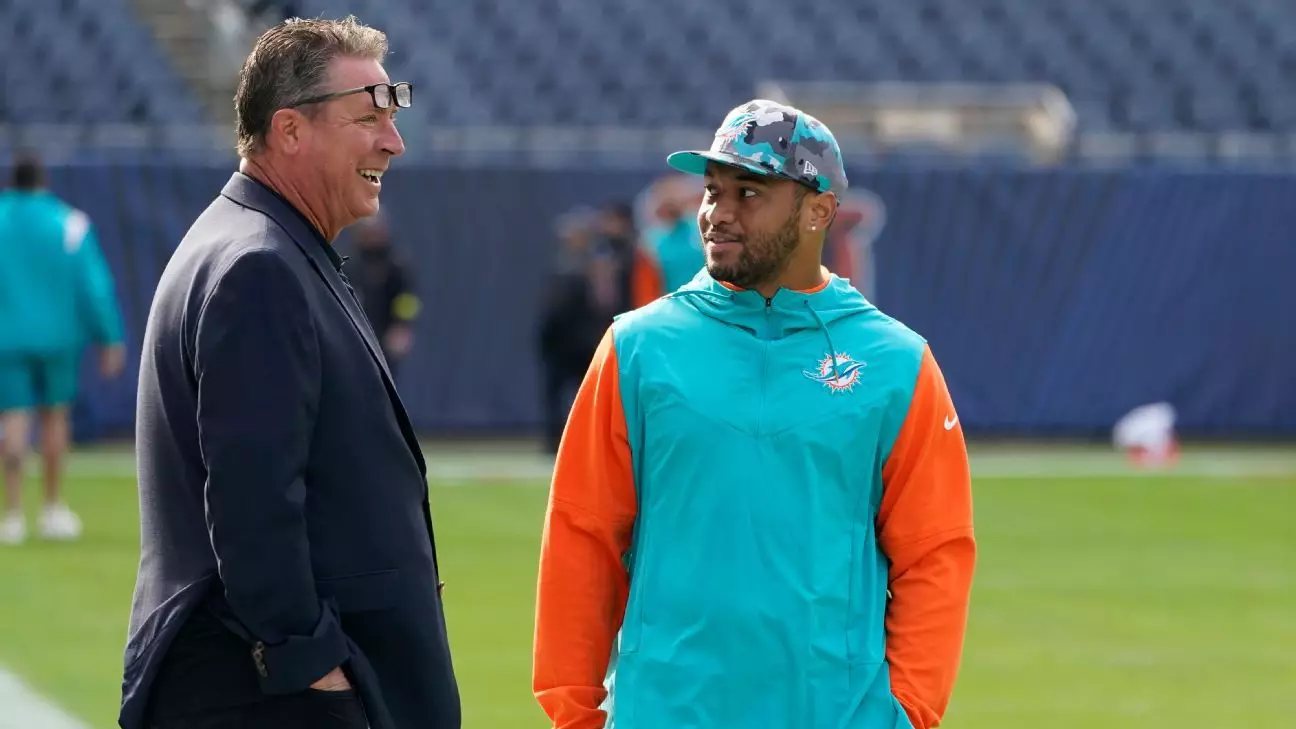As the Miami Dolphins chart their path towards a successful NFL season, the spotlight rests firmly on their young quarterback, Tua Tagovailoa. Recently, Hall of Famer Dan Marino publicly expressed his unwavering support for Tagovailoa while highlighting a crucial factor that remains at the forefront of the organization’s strategy: health. Last summer, the Dolphins made a substantial commitment to Tagovailoa by signing him to a four-year, $212.1 million extension—a clear indication of their belief in his potential as the franchise’s cornerstone. Marino’s endorsement is significant, particularly as he shared these thoughts during his appearance on “The Pat McAfee Show.” However, it is Marino’s acknowledgment of Tagovailoa’s injury challenges that suggests a more critical area of focus for the team’s future success.
Injuries have plagued Tagovailoa since he entered the league, leading to a growing concern about his longevity as a starting quarterback. In Marino’s assessment, the Dolphins showcased undeniable talent throughout the previous season, but availability emerged as a pressing issue, particularly during pivotal moments. Tagovailoa’s missed six games last season—four stemming from concussion-related problems and two due to a hip injury—underscores the harsh reality that professional athletes face. Marino articulated the urgent need for measures to mitigate these risks. “We need to find a way to just keep him healthy,” he emphasized, stressing that sustaining a player’s availability is vital as the season stretches into the playoffs.
While Dolphins General Manager Chris Grier has sought to downplay long-term concerns regarding Tagovailoa’s injuries, he nevertheless acknowledged the pressing need for the quarterback to be proactive about his physical wellbeing. Grier’s comments about the quarterback needing to “know how to protect himself” serve as a reminder that, despite the potential and skill, players hold a pivotal responsibility for their health.
Despite these challenges, Tagovailoa’s performance stats have been nothing short of impressive. Leading the NFL with a career-high 72.9% completion rate during the last season is commendable, considering the games he was unable to play. His 19 touchdowns against seven interceptions demonstrate his capability to impact games positively. Furthermore, his recovery from injuries and subsequent return to form shows sheer determination and resilience. It’s essential to highlight the dual-edged sword of such brilliance; while statistics provide a sense of achievement, they may also mask the underlying issue of sustainability.
In his introspective reflection at the season’s conclusion, Tagovailoa himself acknowledged the frustration that comes with missed games and a growing injury list. “It’s frustrating,” he stated, highlighting the mental toll that such circumstances can impose. This sentiment resonates deeply within the narrative of athletes who struggle to balance performance pressures with the inherent risks of the sport.
Going forward, the Miami Dolphins must cultivate a culture that prioritizes not only individual talent but also player health and longevity. Transitioning from a mindset focused solely on performance metrics to one that emphasizes well-being is crucial. With Marino’s input as a special adviser, leveraging his experience alongside modern medical advancements could aid in fortifying Tagovailoa’s path. By promoting a proactive approach to injury prevention through enhanced training strategies, nutritional support, and mental wellness resources, the team can hope to secure Tagovailoa’s availability in high-stakes moments when it matters most.
Moreover, Tagovailoa himself bears a responsibility to evolve in his approach. As he addresses his injury profile this offseason, fostering an awareness of self-protection on the field could be paramount. Every quarterback faces hits, but the key is to minimize avoidable risks. Developing a strategic mindset that anticipates contact can serve to enhance both his performance and health.
The journey ahead for Tua Tagovailoa and the Miami Dolphins holds promise, but it must be rooted in a commitment to resilience and health. With Marino’s endorsement, the organization stands firmly behind their talented quarterback, but the focus must now shift to ensuring his sustained availability. A dynamic combination of strategic planning, player accountability, and an emphasis on wellness can pave the way for a brighter, injury-free future. For Tagovailoa, the goal remains clear: to transform potential into performance, one healthy series at a time.

